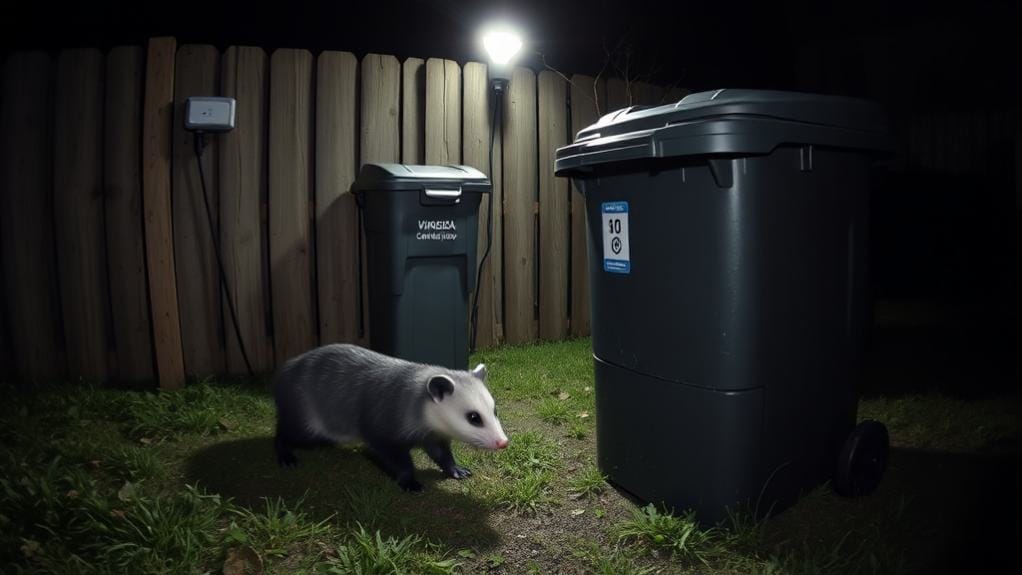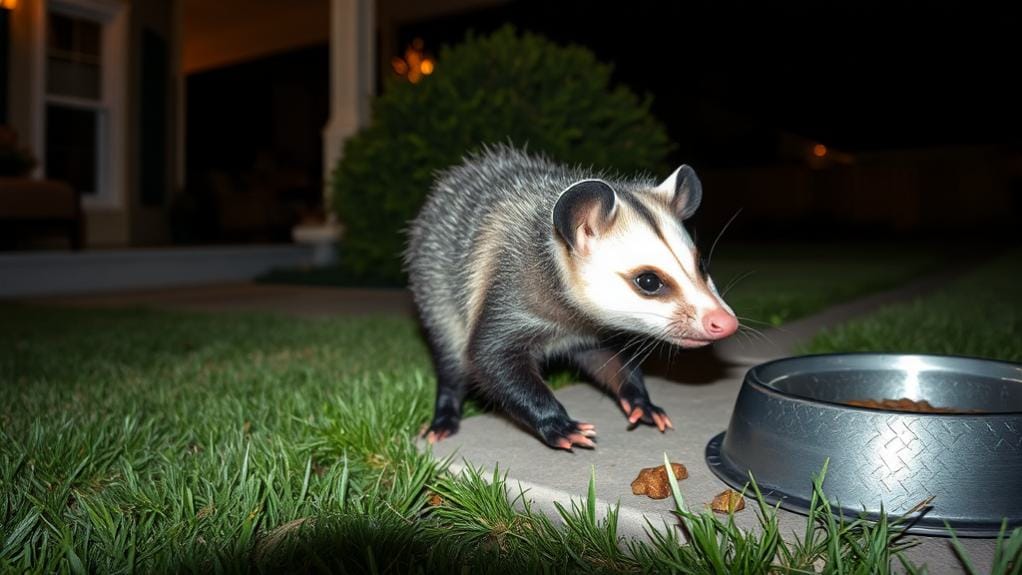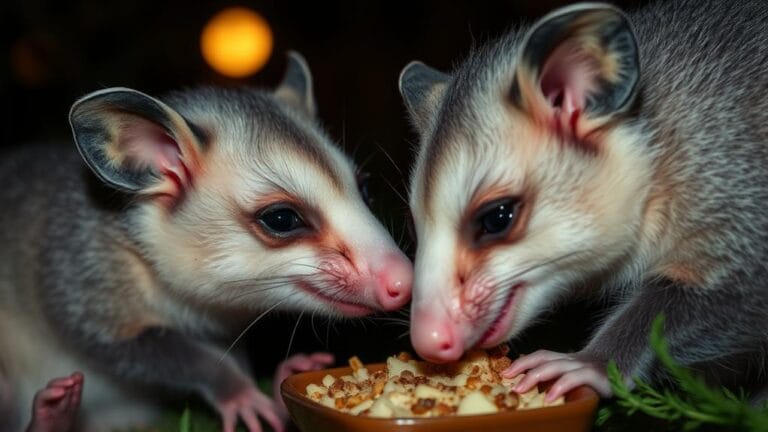While opossums can carry several diseases, they're actually one of the safer wild animals you'll encounter. Yes, they can transmit leptospirosis through urine, coccidiosis that affects pets, and potentially spread toxoplasmosis, tularemia, and salmonellosis. But here's the good news – they rarely have rabies thanks to their low body temperature. Your biggest risks come from direct contact with them or their waste, especially if you're pregnant or immunocompromised. Keep your yard clean, secure your trash, and store pet food inside. Most opossum-related health issues are easily preventable with basic precautions. Stick around to discover why these misunderstood creatures might actually be beneficial neighbors.
The Truth About Opossum Diseases
Table of Contents
Disease carriers lurking in your backyard may sound scary, but when it comes to opossums, the reality isn't as alarming as you might think.
Let me break down the real risks. Yes, opossums can transmit diseases to pets and humans. While they can introduce some health concerns, these natural pest controllers actually help reduce garden pests and maintain ecological balance.
The big ones you need to watch for are leptospirosis (through their urine) and coccidiosis (through opossum feces). They're also potential carriers of toxoplasmosis, tularemia, and salmonellosis.
But here's the good news – these critters actually get a bad rap! They're surprisingly resistant to the rabies virus thanks to their low body temperature. Pro tip: You're more likely to catch something from your neighbor's cat.
Still, I won't sugarcoat it. If you're pregnant or have a weak immune system, keep your distance.
And definitely keep your pets away from areas where opossums hang out.
Common Health Threats From Opossums

Now that you understand the basics of opossum diseases, let's focus on specific health threats these marsupials can present.
I'll be blunt – opossums carry several nasty surprises that can make both pets and people seriously ill.
While humane live traps can help control these pests safely, prevention is essential for protecting your family's health.
Think your outdoor pet food and garbage cans are harmless? Think again. When opossums contaminate these areas, they can spread leptospirosis through their urine. That's a disease known to wreck your liver and kidneys. Not fun!
Here's what should really grab your attention:
- Your pets can get coccidiosis from contaminated food
- Pregnant women and immunocompromised individuals need to watch out for toxoplasmosis (hello, flu-like symptoms!)
- Salmonella's in the mix too – because who doesn't love food poisoning?
*Pro tip: While Opossum diseases are concerning, they're actually less likely to give you rabies than other wild critters. Small comfort, right?*
Preventing Opossum Disease Transmission

A smart homeowner knows that preventing opossum diseases starts with making your property less appealing to these nocturnal visitors.
I'll show you how to keep opossums away and minimize disease transmission risks.
Block entry points effectively by sealing all possible access routes around your house.
First, let's tackle the basics of preventing contact:
- Store all pet food inside – seriously, don't tempt fate by leaving it out
- Use trash bins with tight-fitting lids (those flimsy ones won't cut it)
- Keep your yard squeaky clean and free of fallen fruit
Pro tip: Think like an opossum – if you see a cozy space under your deck, they'll too!
Block entry points around your home and install motion lights.
Trust me, these critters aren't fans of sudden brightness.
Regular cleaning and proper hygiene are your best friends in preventing property damage and keeping disease risks at bay.
Understanding Your Risk Level

Most people overestimate their risk when it comes to opossum-related diseases. Let me break down your actual risk level – you might be surprised.
While opossums can carry several diseases, your biggest concerns are leptospirosis from contact with opossum urine or contaminated water, and parasitic infections from opossum feces.
Using natural deterrent methods like peppermint oil can help keep opossums away and reduce your exposure risk. Here's what you need to know about understanding your risk level:
- You're most at risk if you're handling opossums directly or cleaning areas they've contaminated.
- Common diseases associated with opossums usually require direct exposure.
- Your pets are actually more likely to get sick than you are.
Pro Tip: Your risk drops dramatically with basic preventive measures like wearing gloves and avoiding direct contact with opossums or their waste.
The bottom line? These health threats are real but manageable. Don't panic – just be smart about it.
Safe Coexistence With Opossums

Living safely alongside opossums doesn't require drastic measures – just smart habits and mutual respect. While they can carry diseases, these critters actually play a crucial role in keeping our urban and suburban areas healthy by eating pests. Understanding opossums' defensive behaviors helps make coexistence easier.
| What You Think | What's True | What To Do |
|---|---|---|
| They're aggressive | They avoid conflict | Keep your distance |
| They spread disease | They help keep pests down | Secure garbage cans |
| They attack pets | They prefer to play dead | Bring pet food inside |
| They're pests | They're nature's cleanup crew | Learn their benefits |
*Pro Tip: If you spot an opossum "playing dead," just walk away. They're not trying to trick you – they're literally scared stiff! These misunderstood creatures actually help keep your yard tick-free, so maybe cut them some slack.*
Frequently Asked Questions
What Diseases Do Possums Carry?
I can tell you that possums carry several concerning diseases including leptospirosis, coccidiosis, toxoplasmosis, salmonellosis, and tularemia. While they rarely have rabies, their urine and feces can spread these illnesses.
How Dangerous Are Possums?
While I wouldn't call possums dangerous, I'd advise caution since they can carry diseases like leptospirosis and toxoplasmosis. They're generally timid around humans and actually help control ticks in our environment.
Is Possum Pee Poisonous?
I want you to know that possum urine isn't poisonous, but I'd still be careful since it can carry bacteria and parasites that might make you sick. I recommend avoiding contact and washing up afterward.
How Do Opossums Get Leptospirosis?
While you might think opossums only get sick from eating trash, I can tell you they mainly catch leptospirosis by walking through contaminated water and soil that's been tainted by other infected animals' urine.
Last Word
Opossums aren't the disease-ridden villains we've made them out to be – they're more like nature's clean-up crew. I'll level with you – while these misunderstood marsupials can carry some diseases, they're actually less likely than your neighbor's cat to make you sick. Like Theseus steering through the labyrinth, you just need to follow some basic safety rules. Keep your distance, secure your trash, and let these nocturnal neighbors do their pest-controlling job in peace.








